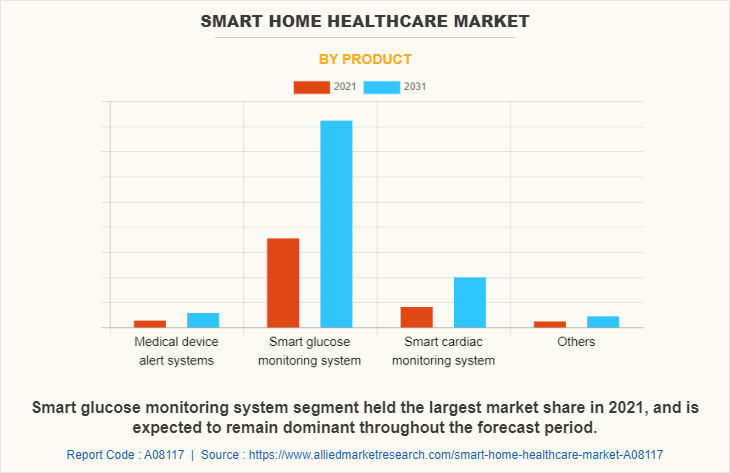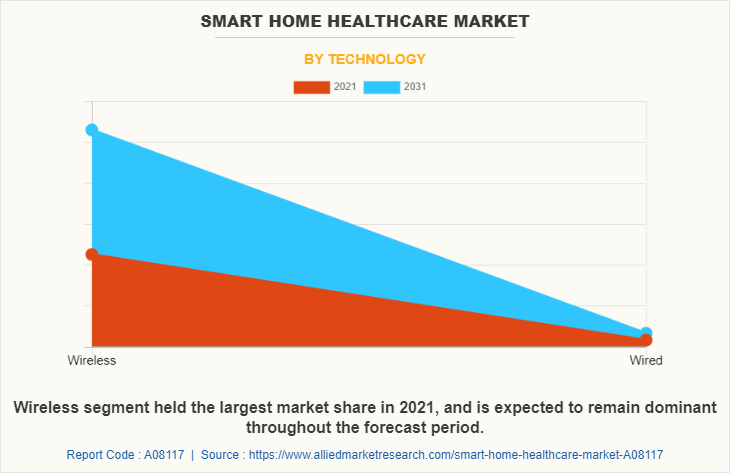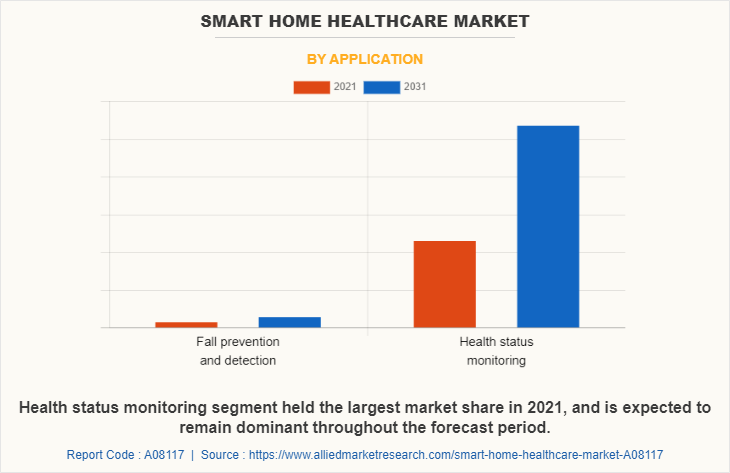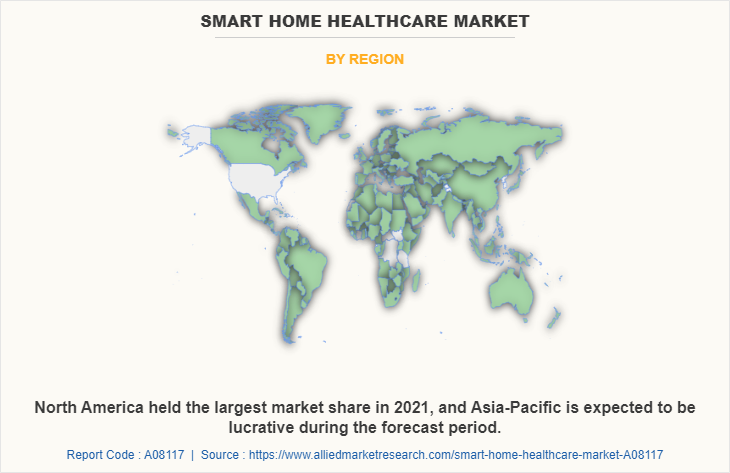Smart Home Healthcare Market Research, 2031
The global smart home healthcare market was valued at $4.81 billion in 2021, and is projected to reach $11.22 billion by 2031, growing at a CAGR of 8.8% from 2022 to 2031.
Smart home healthcare is an ecosystem created in the home, it is embedded with sensors and devices for in-home care of elderly people, outpatients and persons with disabilities. Various smart devices like alert systems, smart watches, glucose monitoring devices, oximeters, and fall prevention & detection systems are used to track various medical parameters which provide better healthcare services by improving quality of life. Smart homes are equipped with internet-connected devices to enable the remote monitoring and management of appliances and systems, such as lighting and heating. Smart devices are either worn by the patient or fitted in the surrounding.

The rapid rise in the geriatric population is the major factor that drives the market growth. As elderly people face more locomotion-related problems and need regular follow up. In addition, an increase in chronic diseases due to the adoption of an unhealthy lifestyle also excepted to the anticipate the smart home healthcare market growth. Furthermore, the Internet of Things (IoT) is gaining popularity day by day also propels the market growth. In addition, technological advancement and the rise in demand for personalized healthcare in developed countries is addressing the growth of smart home healthcare market forecast share. However, concerns regarding data privacy and security are a major restraining factor of the smart home healthcare industry, as this leads to a threat of inappropriate usage of one’s personal information.
Impact of COVID-19
The COVID-19 outbreak is anticipated to have a positive impact on the smart home healthcare market. A huge number of clinics and hospitals across the globe were restructured to increase hospital capacity for patients diagnosed with COVID-19. Non-essential procedures took a potential backlog, owing to rapidly rising COVID-19 cases. The lockdown led to disruption of manufacturing and transportation of healthcare essentials. Furthermore, other factors responsible for the impact on the market include limited availability of medical care, shortage of healthcare staff, and rise in burden of COVID-19 related hospitalization.
Many people suffer from diabetes and cardiac diseases which need regular follow up, as there is lots of burden on healthcare system during the pandemic many people starts using smart devices like smart glucose monitoring system and smart cardiac monitoring system which minimized burden on healthcare system. Smart home healthcare devices do regular follow up and care of patients affected by chronic diseases at home with the advanced comfort. These factors maximized the demand for body smart home healthcare devices for monitoring health during lockdowns thus creating smart home healthcare market opportunity for investors.
Smart Home Healthcare Market Segmentation
The global smart home healthcare market is segmented on the basis of product, technology, application, and region. On the basis of product, the market is categorized into medical device alert systems, smart glucose monitoring system, smart cardiac monitoring system, and others. By application, it is divided fall prevention & detection and health status monitoring. By technology, it is segmented into wireless and wired. Region-wise, it is analyzed across North America, Europe, Asia-Pacific, and Latin America, the Middle East, and Africa (LAMEA)
Segment Review
By product, the market is segmented into medical device alert systems, smart glucose monitoring system, smart cardiac monitoring system, and others. The smart glucose monitoring system segment generated maximum revenue in 2021, accounting for $3522.7 million smart home healthcare market share owing to global rise in diabetic patient. The smart cardiac monitoring system segment is expected to witness highest CAGR of 9.4% during the forecast period, owing to increase in stress in day to day life of common man tends to increase in heart diseases which creates need for smart cardiac monitoring devices.

Depending on technology, the market is divided into wireless and wired. The wireless segment dominated the market in 2021, with $4487.43 million of smart home healthcare market size, and is expected to witness highest CAGR of 8.9% during the forecast period, owing to ease of handling of wireless devices and monitoring data digitally.

Depending on application, the market is divided into fall prevention & detection and health status monitoring. The health status monitoring segment dominated the of smart home healthcare market size in 2021, with $4562.91 million, and is expected to witness highest CAGR of 8.9% during the forecast period, owing to increase in disease prevalence and awareness among population for utilization of such smart devices for a healthy lifestyle.

North America accounted for a majority of the global smart home healthcare industry share in 2021, and is anticipated to remain dominant during the forecast period. This is attributed to technological advancements in smart home healthcare techniques, integration of advanced devices and software in smart home healthcare devices, presence of key and robust infrastructure in the region. However, Asia-Pacific is anticipated to witness notable growth, owing rise in geriatric population, development of healthcare infrastructure and increase in investments projects in the region. Moreover, India and China are expected to witness growth at high CAGR in the smart home healthcare market of Asia-Pacific.

The major players profiled in the report are Abbott laboratories, Agatsa software Pvt Ltd, Apollo Global Management, Inc, Bay Alarm Medical, Connect America, Dexcom, Inc, F. Hoffman-La Roche AG, Qure4u, Medical Guardian LLC, Medtronic, Mytrex, Inc, Nureca Limited,Tunstall Group, Vital Connect, Withings., Sunfox Technologies Pvt Ltd, Mari Group.
Key Benefits For Stakeholders
- This report provides a quantitative analysis of the market segments, current trends, estimations, and dynamics of the smart home healthcare market analysis from 2021 to 2031 to identify the prevailing smart home healthcare market opportunities.
- The market research is offered along with information related to key drivers, restraints, and opportunities.
- Porter's five forces analysis highlights the potency of buyers and suppliers to enable stakeholders make profit-oriented business decisions and strengthen their supplier-buyer network.
- In-depth analysis of the smart home healthcare market segmentation assists to determine the prevailing market opportunities.
- Major countries in each region are mapped according to their revenue contribution to the global market.
- Market player positioning facilitates benchmarking and provides a clear understanding of the present position of the market players.
- The report includes the analysis of the regional as well as global smart home healthcare market trends, key players, market segments, application areas, and market growth strategies.
Smart Home Healthcare Market Report Highlights
| Aspects | Details |
| By Product |
|
| By Technology |
|
| By Application |
|
| By Region |
|
| Key Market Players | Medical Guardian LLC, DexCom, Inc, VitalConnect., Sunfox Technologies Pvt Ltd., Nureca, Qure4u, Bayalarm, Withings, Medtronic, Agatsa Software Pvt.Ltd., Tunstall Group, Abbott Laboratories, MariCare Oy, F Hoffmann Roche, Mytrex Inc., Apollo Global Management, Inc, Connect America |
Analyst Review
This section provides opinions of top level CXOs in the global smart home healthcare market. According to insights of CXOs, leading companies in the market, development of advanced, and reliable smart home healthcare systems has led to extensive number of applications of these devices. Increase in geriatric population, surge in chronic diseases, and demand for better healthcare services is also expected to propel the smart home healthcare market.
CXOs further added that growing geriatric population faces more locomotion related problems, which may lead to decline of an individual requires fall detection & prevention systems. The market gains interest of healthcare companies, owing to its unmet demands in developing economies such as India and China where the population is growing rapidly, along with surge in chronic disease load.
The smart home healthcare industry holds high potential, owing to innovative concepts and multidisciplinary expertise demand for new technological advancements in creation of smart home healthcare devices. The recommendations for them are anticipated to expand with introduction of new cost-effective and technologically advanced devices. Glucose level monitoring system is one of them most employed modern devices as diabetic population is increasing rapidly day by day. Increase in use of smart home healthcare devices by many people has led to enhancement and betterment of a healthy lifestyle. They are capable of pushing boundaries to address an ever-growing range of smart home healthcare devices
The analysis period for smart home healthcare market is 2021-2031.
2021 is the base year considered for smart home healthcare market analysis.
The global smart home healthcare market was valued at $4,811.82 million in 2021, and is estimated to reach $11,215.81 million by 2031, growing at a CAGR of 8.8% from 2022 to 2031.
Utilization of smart glucose monitoring devices and smart cardiac monitoring devices for maintaining a healthy life are the upcoming trends of smart home healthcare market.
Health status monitoring is the leading application of smart home healthcare market.
North America, is the largest regional market for smart home healthcare.
Abbott Laboratories, Medtronic Plc., Dexcom, Inc, F. Hoffman-La Roche AG are the top companies to hold the market share in smart home healthcare market.
Loading Table Of Content...


